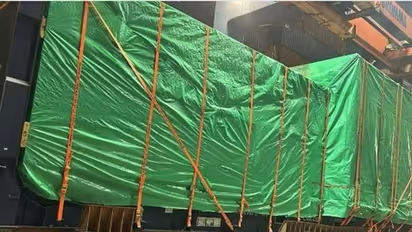After Pakistan, now China denies proliferation concerns following India's seizure of 'dual-use' consignment

Synopsis
Chinese Embassy responds to the interception of a dual-use consignment bound for Pakistan at Mumbai's port, denying proliferation concerns and emphasizing their commitment to international obligations.
In a recent development, security agencies at Mumbai's Nhava Sheva port intercepted and seized a consignment on a Karachi-bound ship from China on Saturday. The consignment, labeled as dual-use with implications for Pakistan's nuclear and ballistic missile programs, has raised concerns and led to a diplomatic response from the Chinese Embassy in India.
The spokesperson of the Chinese Embassy in India, Wang Xiaojian, responded to the incident, stating, "The Embassy noted relevant reports and is verifying its authenticity. As a responsible major country, China has been strictly fulfilling its international non-proliferation obligations and commitments."
The spokesperson further addressed past incidents, mentioning, "In March 2020, some Indian media hyped up the Chinese ship 'Da Cui Yun' for transporting so-called 'dual-use materials.' We have learned that the material is by no means a piece of military equipment or a dual-use item covered by China's non-proliferation export control regime. Skeptical reports or irresponsible hinting are not constructive."
The consignment, intercepted on the Malta-flagged merchant ship CMA CGM Attila, was en route to Karachi when customs officials, acting on intelligence, discovered a Computer Numerical Control (CNC) machine. This Italian-manufactured machine, known for its precision and efficiency controlled by a computer system, was flagged by a Defence Research and Development Organisation (DRDO) team. The DRDO team examined the consignment and confirmed its potential usage in Pakistan's nuclear initiatives, particularly in manufacturing crucial components for missile development.
CNC machines are subject to the Wassenaar Arrangement, an international arms control regime targeting the spread of items with dual civilian and military applications. The significance of this interception is underscored by the historical use of CNC machines by North Korea in its nuclear program.
Further investigations revealed discrepancies in shipping details, prompting concerns of potential evasion tactics to conceal the true recipients. This incident follows previous seizures of dual-use military-grade items transhipped from China to Pakistan, raising questions about illicit procurement activities.
The ongoing probe seeks to determine if the suspected Pakistani entities receiving these items are linked to the Defence Science and Technology Organisation (DESTO), responsible for Pakistan's defense research and development.
The consignment, weighing 22,180 kilograms, was initially labeled with "Shanghai JXE Global Logistics Co Ltd" as the consigner and "Pakistan Wings Pvt Ltd" of Sialkot as the consignee. However, further investigation revealed that the consignment was shipped by Taiyuan Mining Import and Export Co Ltd, intended for Cosmos Engineering in Pakistan.
On Saturday, Pakistan strongly denounced the move, accusing India of high-handedness and emphasizing the misrepresentation of facts by Indian media outlets.
Dismissing these claims, a spokesperson for the Pakistani government said the intercepted consignment contained a commercial lathe machine imported by a Karachi-based entity specializing in supplying parts to the automobile industry in Pakistan. The spokesperson went on to highlight that the transaction was conducted transparently through proper banking channels, with all relevant documents in place.
Pakistan strongly condemned what it perceives as India's unwarranted interference in commercial affairs, labeling it a disruption of free trade and underscoring the risks associated with arbitrary assumptions of policing roles by states with questionable credentials.
Stay updated with the Breaking News Today and Latest News from across India and around the world. Get real-time updates, in-depth analysis, and comprehensive coverage of India News, World News, Indian Defence News, Kerala News, and Karnataka News. From politics to current affairs, follow every major story as it unfolds. Get real-time updates from IMD on major cities weather forecasts, including Rain alerts, Cyclone warnings, and temperature trends. Download the Asianet News Official App from the Android Play Store and iPhone App Store for accurate and timely news updates anytime, anywhere.